
C. R. Evers & Co. was a Danish confectionery company based in Copenhagen, Denmark. The Evers brand is now owned by Carletti.

C. R. Evers & Co. was a Danish confectionery company based in Copenhagen, Denmark. The Evers brand is now owned by Carletti.
C.R. Evers & Co. was founded by Christian Rudolph Evers (1821-1877) in 1867. [1] Educated as a pharmacist in 1843, had later worked first as a merchant in Vejle and then as a brewer and manufacturer of candles in Ribe. In 1984 he was granted a royal monopoly on the production of a malt extract of his own invention. The malt extract came in a small tin box and was used for a preparation of a "tasty, potent beer-like drink". He was that same year also granted a patent on the malt extract in Sweden, Belgium, France, Austria and Hungary. The name C.R. Evers & Co. was adopted when the cost of obtaining these patents forced him to enter into a partnership with other investors. [2]
Evers' widow continued the company after his death in 1877. She completed a new factory on Peder Skrams Gade in Copenhagen's new Gammelholm neighbourhood.
Helmuth Brix acquired the company in 1886. He inaugurated a new factory at Østre Fasanvej 15 (now Nordre Fasanvej 101) in 1896. Illustreret Tidende brought an article about the company in connection with its 40th anniversary.
The company was in 1924 acquired by A. Fredsted (born 1887) and C. Fjeldborg (born 1879). [3] The company was later in the century subject to a number of mergers and disappeared in the 1990s. The Evers brand is now owned by Carletti.
In Hans Scherfig's Stolen Spring , it is a poisoned Evers Melt Drop that causes the sudden death of C. Blomme.[ citation needed ]

Foster's Lager is an internationally distributed brand of Australian lager. It is owned by the Japanese brewing group Asahi Group Holdings, and is brewed under licence in a number of countries, including its biggest market, the UK, where the European rights to the brand are owned by Heineken International.
Ice beer is a beer that has undergone some degree of freezing during production. These beers generally have a higher alcohol content, and lower price relative to it.

Stout is a type of dark beer that is generally warm fermented, such as dry stout, oatmeal stout, milk stout and imperial stout. Stout is a type of ale.

The Miller Brewing Company is an American brewery and beer company in Milwaukee, Wisconsin. It was founded in 1855 by Frederick Miller. Molson Coors acquired the full global brand portfolio of Miller Brewing Company in 2016, and operates the Miller Brewery at the site of the original Miller Brewing Company complex.

Horlicks is a British sweet malted milk hot drink powder developed by founders James and William Horlick. It was first sold as "Horlick's Infant and Invalids Food", soon adding "aged and travellers" to their label. In the early 20th century, it was sold as a powdered meal replacement drink mix.

Carlsberg A/S is a Danish multinational brewer. Founded in 1847 by J. C. Jacobsen, the company's headquarters is in Copenhagen, Denmark. Since Jacobsen's death in 1887, the majority owner of the company has been the Carlsberg Foundation. The company's flagship brand is Carlsberg. The company employs around 41,000 people, primarily in Europe and Asia. Carlsberg is currently the 6th largest brewery in the world based on revenue.
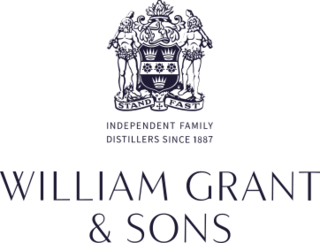
William Grant & Sons Ltd is an independent, family-owned Scottish company that distills Scotch whisky and other selected categories of spirits. It was established in 1887 by William Grant, and is run by Grant's descendants as of 2018. It is the largest of the handful of Scotch whisky distillers remaining in family ownership.

Sapporo Breweries Ltd. is a Japanese beer brewing company founded in 1876. Sapporo is the oldest brand of beer in Japan. It was first brewed in Sapporo, Hokkaido, Japan, in 1876 by brewer Seibei Nakagawa. The world headquarters of Sapporo Breweries is in Ebisu, Shibuya, Tokyo. The company purchased the Canadian company Sleeman Breweries in 2006.

The Pabst Brewing Company is an American company that dates its origins to a brewing company founded in 1844 by Jacob Best and was, by 1889, named after Frederick Pabst. It outsources the brewing of over two dozen brands of beer and malt liquor. These include its own flagship Pabst Blue Ribbon, as well as brands from many defunct breweries.

Genesee Brewing Company is an American brewery located along the Genesee River in Rochester, New York. From 2000 to 2009, the company was known as the High Falls Brewing Company. In 2009, High Falls was acquired by the capital investment firm KPS Capital. Together with newly acquired Labatt USA, KPS merged the two companies as North American Breweries. Along with this change, High Falls Brewery changed its name back to the original "Genesee Brewing Company" operating under the North American Breweries name. In October 2012, North American Breweries was purchased by FIFCO.

Olgerdin is an Icelandic brewery and beverage company based in Reykjavík. Established on 17 April 1913, the oldest beer-producing factory in Iceland. Annually, it produces 45 million liters of beverages. The brewery is named for Egill Skallagrímsson, an early inhabitant of Iceland and main character of Egil's Saga.
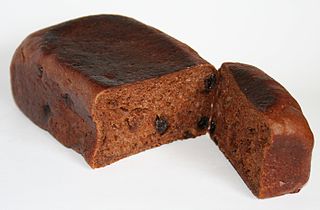
Malt loaf is a type of sweet leavened bread made with malt extract as a primary ingredient. It has a chewy texture and often contains raisins. It is usually eaten sliced and spread with butter for tea. Malt flour is sometimes used to supplement the flavour.
Heineken Malaysia Berhad is a major producer of beer, stout, cider and non-alcoholic malt beverages in Malaysia and has been listed on the Main Board of Bursa Malaysia since 1965. Among the brands they produce and market are Heineken, Tiger Beer, Tiger Crystal, Guinness, Strongbow Apple Ciders, Apple Fox Cider, Anchor Smooth, Kilkenny, Anglia, and Malta. The company also imports and distributes Heineken 0.0, Paulaner and Kirin Ichiban.
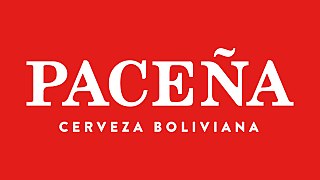
Paceña is a Bolivian beer produced in La Paz, hence its name that means "the one of La Paz". The beer is produced by CBN, an AB InBev company that dates back to 1877 and that controls 80% percent of the Bolivian beer market. Paceña is made at about 3,600 meters above sea level with purified water from the Andes.

Søndre and Nordre Fasanvej are two streets that form a lengthy south-to-north artery through Frederiksberg, an independent municipality surrounded by the larger Copenhagen Municipality in Copenhagen, Denmark. The southern part of the street is characterized by large green spaces and attractive residential neighborhoods. In contrast, its northern part, extending into the Nørrebro and North-West districts of Copenhagen, is marked by former industrial sites. The street is named after Fasangården, a former royal pheasantry located in Frederiksberg Park.

Porcelænshaven in the Frederiksberg district of Copenhagen, Denmark, is the former premises of the Royal Porcelain Manufactury, an industrial complex dating from the 1880s which was converted into a mixed-use neighbourhood in the 2000s. Located on the corner of Søndre Fasanvej and Smallegade, adjacent to Frederiksberg Gardens, it has an area of about five hectares and consists of a mixture of dwellings, commercial space and premises for Copenhagen Business School, whose main campus is located nearby. Many of the historical buildings have been retained, including a landmark chimney and the listed director's residence from 1908.
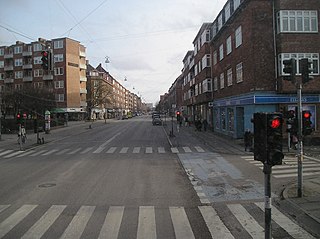
Peter Bangs Vej is a 2.2 km long street in Frederiksberg, a city in the Copenhagen area on the island of Zealand, Denmark. The direct continuation of Smallegade, it initially runs west, from Nordre Fasanvej, but then turns south along the east side of Damhus Lake to meet Roskildevej. There is a large sports complex on the south end of the street with the football club F.C. Copenhagen's training facilities as well as the multi-purpose venue K.B. Hallen.
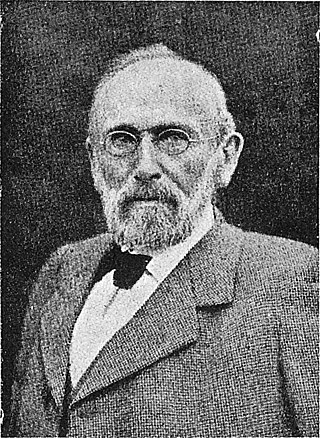
Gustav Adolph Hagemann was a Danish engineer and businessman. He was chief technical officer of the Danish Sugar Factories from 1872 to 1897 and then served as chairman of the board until 1916. He owned several sugar plantations on Saint Croix in the Danish West Indies.

The Philip de Lange House, built in association with a nitrary in the 1750s, is the Rococo-style former home of Dutch-Danish architect and master builder Philip de Lange at Prinsessegade 54 in the Christianshavn neighborhood of Copenhagen, Denmark. It was from 1877 to 1864 part of the Royal Porcelain Manufactory's Christianshavn factory and is now hidden from the street by a school building from 1865. The house was listed on the Danish registry of protected buildings and places in 1932. It is now part of Christianshavn School and houses the school's after school programmes.

Sødring & Co. was a Danish manufacturer of artificial mineral water and soft drinks based in Copenhagen, Denmark. The company was initially based in Rabeshave in Christianshavn, then at Kompagnistræde 20 from 1860 and finally at Østerbrogade 48 in Østerbro from 1886. A branch in Aalborg was established in 1870 and from 1926 continued as an independent company under the name Sødring & Co.'sEftf.. The remainder of the company was in 1929 acquired by Rosenborg Brøndanstalt.
{{cite web}}: CS1 maint: multiple names: authors list (link)